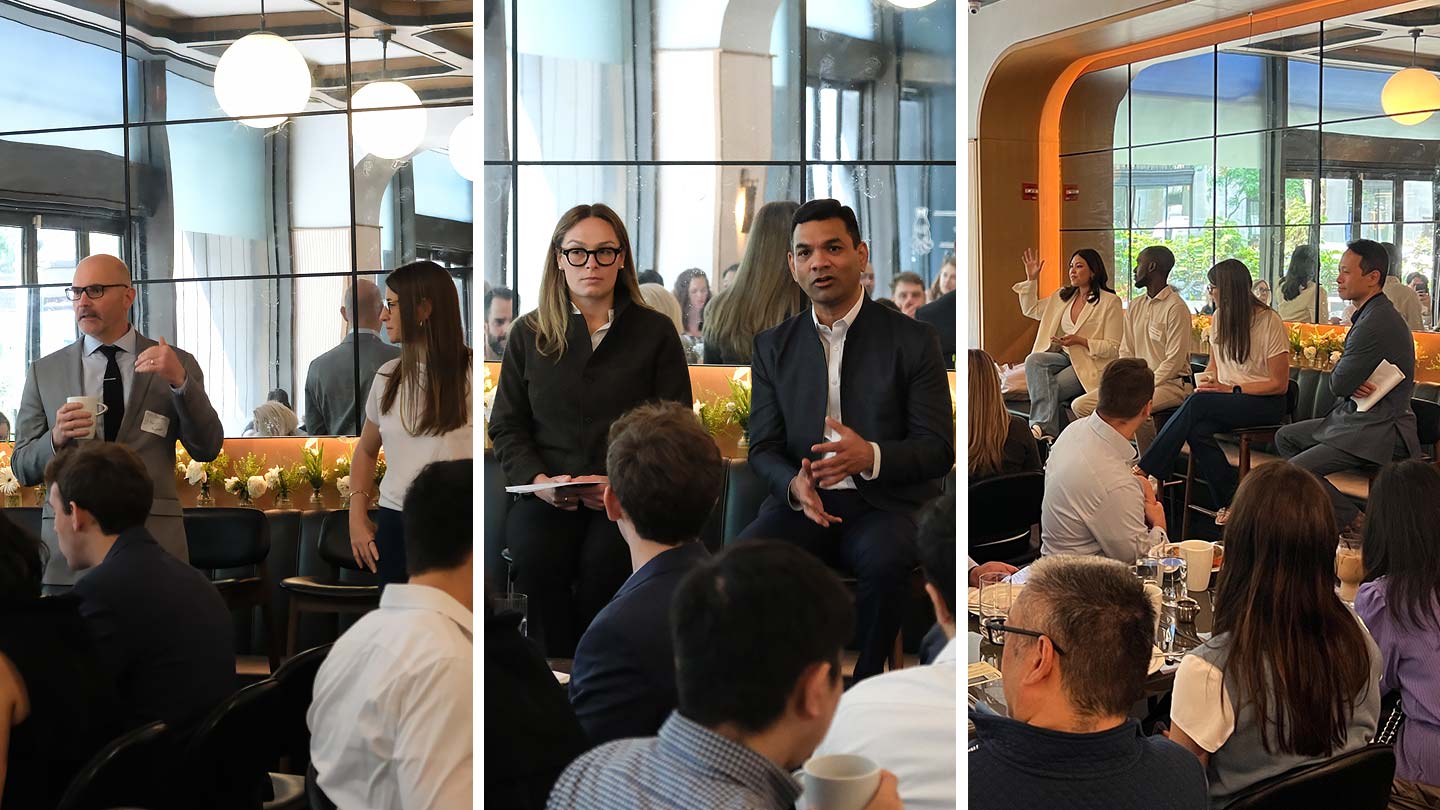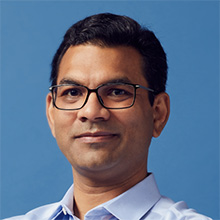
Key takeaways
- Sri Shivananda, Head of Technology at J.P. Morgan Payments, sees the future of payments rooted in nimbleness, agility and adaptability.
- With a foundation of trust and a deeply curious culture, J.P. Morgan Payments is not only adapting to change but also helping define what’s next in financial infrastructure.
On Wednesday, June 4, as a part of Tech Week NYC and in collaboration with Tech:NYC, J.P. Morgan Payments convened industry leaders and members of the media to discuss the latest trends in fintech and technology in New York and beyond. J.P. Morgan Payments Head of Technology Sri Shivananda and Bloomberg reporter Paige Smith kicked off the conversation, covering the firm’s continued investment in technology, its trusted reputation and ability to scale, and how curiosity and agility are powering the next wave of payments innovation.
The event, which played to a standing-room-only crowd, also featured a dynamic panel discussion featuring Julie Samuels, President and CEO of Tech:NYC, Nicole Casperson, founder & CEO of Fintech Is Femme, and Dennis Owusu-Sem, COO of This Week in Fintech. Moderated by CNBC reporter Hugh Son, the conversation explored fintech media trends and the evolving narrative around New York City’s growing technology ecosystem.
From Robust, but Rigid to Adaptable and Nimble: The Evolution of Payments Tech
Shivananda opened the session by reflecting on the evolution of payments technology. “Technology in the first generation of payments was all about getting it up and running and making sure that it was robust, but it was rigid” he said. “Now, it's about nimbleness, agility, adaptability and the best experience that you can serve for the customer.”
As a payments veteran with almost three decades of experience in the payments and tech industries, Shivananda has witnessed and led this transformation firsthand.
Scaling Innovation Through Trust and Distribution
In discussing the scale of J.P. Morgan Payments, Shivananda underscored that its strength isn’t just in numbers, but in the depth of client relationships. “I have always thought of money as a business of trust,” he said. “We, of course, have the distribution advantage as well as a loyal customer base with whom we have built, aggregated and cultivated trust over time.”
This foundation enables the firm to bring new innovations to market and quickly deliver them across a global client base. “Each time we put innovations out, we make sure that we build on it, and take on modern ways of helping [clients] with managing their money, moving their money, doing payments and serving the customers they want.”
Four Trends Reshaping the Payments Industry
Looking ahead, Shivananda highlighted four trends that he believes will define the future of payments.
- Planet-scale architectures: These systems are designed to deploy globally, comply locally and serve personally. Shivananda acknowledged that this is not an easy problem to solve, particularly given the regulatory complexities across jurisdictions. But he believes solving for this scale is foundational to delivering personalized, compliant experiences worldwide.
- Digital ledger transformation: Digital ledgers have “an opportunity to reshape payments completely.” While consumer experiences have become more seamless, often ambient and invisible, the core infrastructure has stayed largely unchanged for decades. “That's beginning to shift,” he said, as the foundation becomes more “scaled, flexible, agile, nimble [and] innovation-friendly.”
- With digital payments evolving, cryptographic security has become even more central. Shivananda described this as part of the foundation that enables trust and safety at scale: “Delivering security the way our customers expect it, in fact, probably better than our customers expect it sometimes, is now table stakes.”
- Artificial intelligence: J.P. Morgan Payments is applying AI across both internal systems and emerging client-facing solutions. Shivananda described a two-by-two framework — assist vs. act, internal vs. external — and noted that while much of the current focus is on internal use cases like risk management, "with the right focus on guardrails... you can take it out to the customer." He emphasized the importance of innovation, trust, ethics, and regulatory alignment as AI capabilities evolve and are introduced to clients as commercialized use cases.
Maintaining an Innovation Mindset
When asked what he wishes more people knew about J.P. Morgan Payments, Shivananda pointed to its innovation mindset.
"We are a 225-year-old company that is ahead of everyone else in the industry, and yet we remain deeply curious,” he said. “We are continually assessing, analyzing and questioning everything …how do we out-innovate ourselves and out-innovate the industry every day?"

Sri Shivananda
Head of Technology, J.P. Morgan Payments
From foundational architecture to emerging technologies, the conversation reinforced that J.P. Morgan Payments is not just keeping pace with change but leading an innovative way forward.
For those with a subscription to Bank Automation News, you can read more takeaways from the event here.